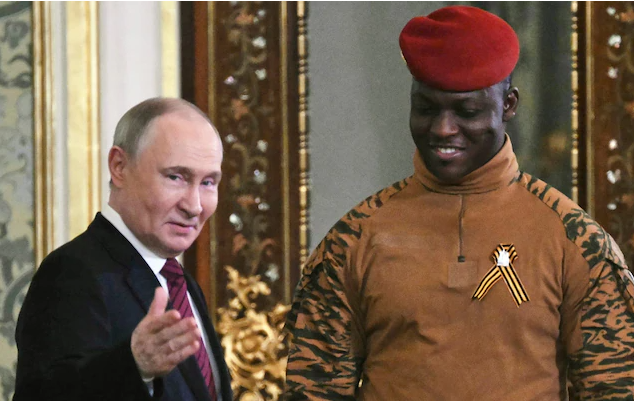**Headline: Burkina Faso’s Military Revolution: Traoré’s Bold Alliance with Putin Reshapes West African Power Dynamics**

In a shocking and transformative development, Burkina Faso’s President Ibrahim Traoré has returned from Moscow with a game-changing military strategy that could redefine power dynamics in West Africa. Traoré’s clandestine meetings with Russian President Vladimir Putin have set off a wave of military restructuring that not only modernizes Burkina Faso’s defense capabilities but also signals a significant shift away from Western influence in the region.
The aftermath of Traoré’s Moscow trip is evident as military camps across Burkina Faso undergo a radical transformation. Gone are the days of outdated Western military gear; in its place, a new arsenal of Russian-made equipment is flooding in under tight security. Reports indicate that troops are now being trained in advanced techniques modeled after Russia’s hybrid warfare strategies, with an emphasis on dominance rather than restraint. This marks a departure from traditional counterinsurgency tactics, signaling a pivot toward a more aggressive military posture.

The numbers tell a compelling story: entire battalions of Burkinabe soldiers are now scheduled for combat training rotations in Russia, focusing on urban warfare, cyber resilience, and unconventional tactics. The shift from decentralized Western-style units to a more hierarchical structure mirrors the Russian military doctrine, emphasizing speed, loyalty, and a unified command. This new military vision is not just about combating insurgents; it is about fortifying a political institution capable of repelling foreign threats and ensuring internal stability.
Furthermore, the Russian influence extends beyond military training. Reports reveal that Russian advisers are now embedded within key command posts, directly influencing tactics and operational objectives. This infiltration of Burkinabe military intelligence signifies a strategic reorientation, as information flows that once relied on Western liaison offices are now rerouted through Russian channels. This newfound autonomy allows Burkina Faso to pursue its own agenda without the constraints imposed by foreign donors.
In a parallel development, the shadowy presence of the Wagner Group—a notorious private military contractor—has re-emerged in Burkina Faso. Although officially denied by Moscow, the group’s activities are evident in the country’s military landscape, where they are reportedly involved in securing vital resources and suppressing dissent. Human rights observations indicate a chilling climate where dissenting voices vanish without a trace, hinting at Wagner’s role in enforcing a new order that tolerates no disruption.

The implications of this military overhaul are profound, not just for Burkina Faso but for the entire Sahel region. With the backing of Russia, Traoré is not merely building an army; he is constructing a new political order that challenges the long-standing influence of Western powers like France and the United States. The shift has prompted neighboring nations to reevaluate their alliances, as the ripple effects of Burkina Faso’s newfound autonomy and strength are felt throughout West Africa.
Moreover, the partnership with Russia encompasses economic strategies that aim to liberate Burkina Faso from the shackles of foreign dependency. Agricultural initiatives are underway to boost local food production, reducing reliance on imports, while discussions about refining the country’s rich gold resources domestically could transform Burkina Faso’s economic landscape. This ambitious drive for self-sufficiency aligns with Traoré’s broader vision of sovereignty and national pride.
As Burkina Faso embarks on this bold new chapter, the West watches with apprehension, realizing that the balance of power is shifting. The silence from Western capitals is deafening, revealing a sense of uncertainty and a desperate scramble to regain influence. The implications of Traoré’s decisions extend beyond mere military alliances; they challenge the very foundations of post-colonial relationships in Africa.
In this rapidly evolving narrative, one thing is clear: Burkina Faso is no longer the passive player in a geopolitical game dominated by Western powers. With a handshake in Moscow, Ibrahim Traoré has not only secured military support but has also ignited a vision of a sovereign nation ready to reclaim its future on its terms. As the Sahel braces for the impact of this transformation, the world watches closely, questioning what this shift could mean for the region and beyond.